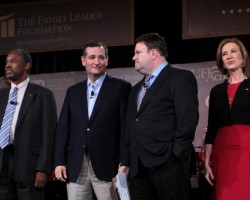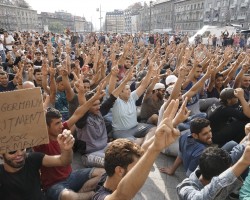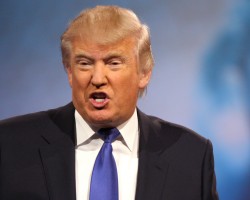
Donald Trump Is Helping the Terrorists Win
Donald Trump Is Helping the Terrorists Win
By Steven Simon and NSN Advisory Board Member Daniel Benjamin
December 15, 2015 | POLITICO
American politics are undermining American national security. In their jockeying for the Republican presidential nomination, GOP contenders—Donald Trump above all—have managed to exacerbate dramatically the two U.S. weaknesses most likely to erode our country’s safety: fear and Islamophobia.
The United States has made tremendous progress in the fight against terrorism since September 11. Yet it has also become all too clear that we are short of the kind of societal resilience that is essential for our success in fighting terrorism. Beyond that, we lack a shared recognition of the importance of the American Muslim community in preventing the spread of extremism. In recent weeks, the Republican candidates have worsened matters markedly through their relentless stoking of public panic and hatred of Muslims.
U.S. politicians are, in short, inviting attack.
Consider this: In the 14 years since 9/11, only 45 Americans have been killed (including the 14 last week in California) on American soil by jihadist violence. Every one of those losses is tragic, and because the fear that one attack suggests another might be around the corner, terrorist casualties have an outsize impact. But in light of an armed, global foe and the universal certainty that we would experience one or more catastrophic attacks with four- or five-digit death tolls after the destruction of the Twin Towers, that is an extraordinary figure and testament to American ingenuity in an extraordinarily complex effort.
And yet, despite vast and productive investments in intelligence, law enforcement and the military, public discussion—and especially the political rhetoric of the moment—suggests that we face imminent disaster. Public opinion polling reveals a society gripped by fear, even if the odds of personally being affected by terrorism are vanishingly small.
Some of this is undoubtedly due to the ever more media-saturated world we inhabit; wall-to-wall television coverage, even when there is nothing new to report, heightens the sense of fear. But there is also a feedback mechanism driven by our politics that is vastly magnifying the anxiety. In the wake of San Bernardino, Republican candidates wrestled to see who could inflate the significance of the attack most. Mike Huckabee, attacking President Barack Obama’s response, likened the mass shooting to Pearl Harbor. Chris Christie, after making the vacuous argument that every place in America could be attacked, went bigger still: “We need to come to grips with the idea that we are in the midst of the next world war.”
Marco Rubio used the classic technique of heightening fear by talking about how fearful everyone was: “People are really scared and worried,” Rubio told Fox News. “You know, last night I ran into a couple who often travels abroad or to other parts of the country for New Year’s Eve. For the first time in over a decade, they’re not traveling anywhere this year because they’re so scared. Ran into someone else today who said they’re avoiding stadiums and malls during the holiday season because they’re scared.” Former Virginia Gov. Jim Gilmore saw a chance to extricate himself from the cellar of the race with apocalyptic rhetoric, speaking of San Bernardino and saying, “We have to be prepared because the world is breaking down.”
Nothing could be more counterproductive: It is axiomatic in counterterrorism that to win, we must diminish the payoff the terrorists receive from their attacks. That means limiting casualties whenever possible, and the police who stopped Syed Farook and Tashfeen Malik from attacking a second time deserve real gratitude. But it also means maintaining some perspective on the event and not allowing it to go viral. The public attention and the fear that the San Bernardino attack has engendered compared, for example, with the 2009 Fort Hood shooting has been off the charts. We are enabling the terrorists to terrorize us.
Fear-mongering has been a primary feature of the national discussion about terror since Obama assumed office. It began with strong partisan opposition to his plan to close the prison facility at Guantánamo—a prospect that attracted little attention when George W. Bush first proposed it. There is abundant evidence that U.S. military brigs and supermax penitentiaries—from which no one has ever escaped and which are more often criticized as being cruel and inhuman than lax—are easily capable of safely holding the remaining Guantánamo detainees. Still, the president’s critics have routinely suggested that no facility could hold them and closing the facility would be opening the door to a terrorist rampage in the continental United States.
With the rise of ISIL, the scare tactics have multiplied exponentially. Presidential hopeful Sen. Lindsey Graham prophesied an “American city in flames” after the fall of Mosul, while Oklahoma Sen. Jim Inhofe warned of an ISIL program to develop a weapon that would destroy whole cities—a program unknown to the U.S. counterterrorism community. Texas Gov. Rick Perry and at least two Republican House members have spoken ominously about jihadists’ using a base across the border in Mexico to infiltrate the United States, another complete fantasy.
More recently, the debate over accepting Syrian refugees has intensified a fearfulness that now verges on hysteria. The United States has accepted more than 130,000 refugees from Iraq, for example, since 2007. No terrorist violence has been committed by any of them since arriving in the country. Two Iraqis were found in 2009 to have been involved in terrorism in Iraq; they were arrested and have since received sentences of 40 years and life in prison. Refugee vetting processes have been tightened even more since. And yet elected officials and much of the public routinely ignore all of these facts.
Using fear to get ahead in American politics might not be a new phenomenon, but it is more dangerous than ever. Consider the difference between the discussion of terrorism today and, say, the missile gap debate in the 1960 election—an issue of truly existential dimensions. The Politburo was not going to launch a nuclear strike against the United States because of our presidential campaign or our national mood. But ISIL and Al Qaeda in the Arabian Peninsula—which is still the jihadist group most likely to carry out a major strike against U.S. interests—will undoubtedly be more motivated to attack us because we, as a nation, are afraid. Homegrown terrorists—as Farook and Malik appear to have been—will also see a greater reason to act now given the potential for overreaction and political crisis.
Closely linked to the issue of fear-mongering is the Islamophobia now surging through the body politic. Republicans may be congratulating themselves for denouncing Trump’s latest vicious buffoonery—his proposal to bar Muslims, including American citizens, from entering the country. But many of them are enjoying cruising in his slipstream. Where were they when Trump declared that the way to defeat terrorists was “to take out their families” in contravention of the laws of war and more than 200 years of United States military practice?
Comments such as these perfectly validate the part of ISIL’s narrative—which it appropriated from Al Qaeda—that says the West seeks to destroy Islam and its believers. The same is true for all the menacing rhetoric about creating national registries for Muslims in the United States and for cutting off Muslims from their families abroad. Proposals like these further undermine one of the most powerful claims America makes to Muslims abroad in its public diplomacy—namely, that the United States is a safe haven from the violent hatreds now roiling the world.
The ease with which Ben Carson has been able to suggest that a Muslim should not be president and with which Jeb Bush and Ted Cruz have proposed preferential treatment for Christian refugees from the Middle East is appalling. They are espousing, as so many have pointed out, bigotry for political ends. They evince a total misunderstanding of what the United States needs for domestic security.
There seems to be no recognition of how much our security depends on the state of the American Muslim community. Intelligence and law enforcement do a great deal to prevent attack, but it is because of the relatively well-integrated American Muslim community, which has been largely immune to extremism, that the number of terrorism victims at home is so low.
Just consider some of these statistics: According to FBI Director James Comey, there are 800 open investigations into domestic extremists. The director of MI5 in Britain might envy that number. British counterterrorism officials have for years spoken of their 3,000 individuals “of concern”—a figure that never varies because, as they point out, they don’t have the manpower to cover more.
And those 45 casualties? Since 9/11, Spain, France and Britain have all had individual terrorist incidents that killed more people than that. Muslims make up approximately 3.8 percent of the population of the European Union, or a bit less than five times as much as in the United States. Yet, in the past 14 years, jihadist violence has claimed more than nine times as many victims on EU soil than in the United States. The number of American Muslims who have gone to fight with ISIL relative to the size of our population is one-third what it is in Europe.
No one is suggesting that all is rosy in the American Muslim community. Un- and underemployment in the Muslim community is 9 percent higher than in the nation as a whole. But the evidence to date suggests that the United States has been very fortunate: Muslims here are better integrated and less alienated than almost everywhere else in the West. Geographically, they are spread out through the United States, which has nothing like the Muslim urban ghettos of Europe. Economically, the Muslim community looks like the Catholic community. A large majority believes hard work pays off—which means they see the U.S. workplace as fundamentally fair. They reject extremism by large majorities—larger, in fact, than their European counterparts.
In a period when the terrorist threat is principally a threat from within—from homegrown militants, rather than foreign operatives trying to penetrate U.S. border controls from abroad, these characteristics add up to a huge advantage for the United States: American Muslims are less likely than European Muslims to become terrorists, and American-Muslim communities are more prone to police their own, and even to assist U.S. law enforcement when something goes very wrong.
Read the full article here.
Photo Credit: Donald Trump at New Hampshire Town Hall on August 19th, 2015 [Michael Vadon, accessed 12/15/2015]






